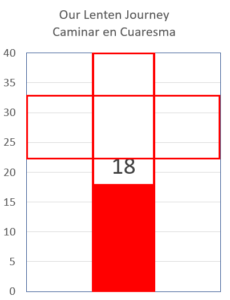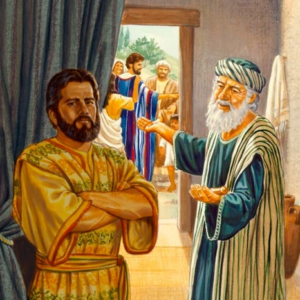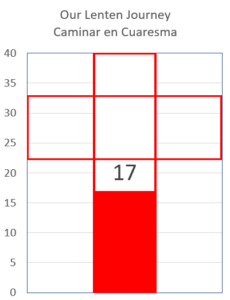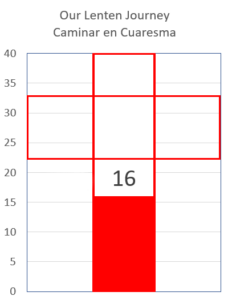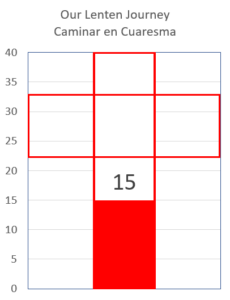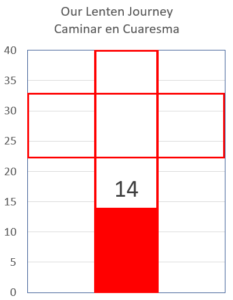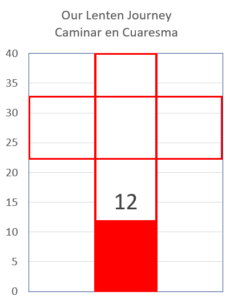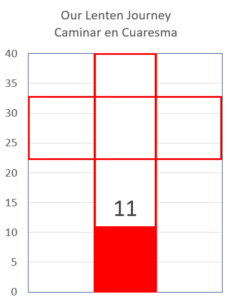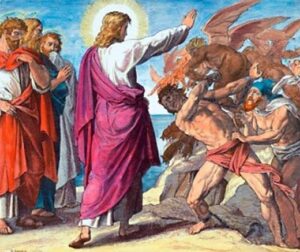
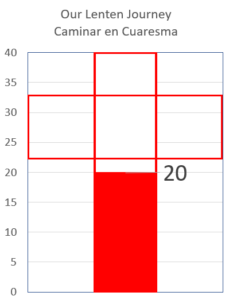
Our Lenten Journey / Caminar en Cuaresma
versión en español
Thursday – March 16 – Day 20 (Our Journey is half over)
The Kingdom of God is Upon Us
“But if it is by the finger of God that I drive out demons, then the Kingdom of God has come upon you.” Luke 11:20
The Kingdom of God can come upon us in a variety of ways. The line from today’s Gospel above comes in the middle of a story of Jesus casting out a demon from a man who was mute. Once the demon was cast out, the mute man began to speak, and all were amazed. And though some were amazed and grew in faith as a result, others turned their amazement into irrationality.
The irrationality of some was that they saw what Jesus did, but they didn’t want to accept that His power was divine. Therefore, some of them said, “By the power of Beelzebul, the prince of demons, he drives out demons.” They couldn’t deny that Jesus drove out a demon, since they saw it happen with their own eyes. But they were unwilling to accept Jesus’ divinity, so they jumped to the irrational conclusion that Jesus’ act was done by the power of “the prince of demons.”
This irrational stance of some people is one of the most dangerous stances one can take. It’s the stance of an obstinate heart. They were given the incredible witness of the power of God at work but refused to respond in faith to what they witnessed. For those who are obstinate, when the Kingdom of God comes upon them, as Jesus stated above, the effect is that they react in a violent, angry and irrational way. This form of reaction is exceptionally prevalent today in the secular world. Many in the secular media, for example, constantly react violently and irrationally to all that is part of the Kingdom of God. As a result, the evil one easily misleads many, causing confusion and chaos.
For those who have eyes to see clearly, this violent and irrational rejection of the Kingdom of God is very clear. And for those with faith and an open heart, the pure message of the Gospel is like water to a dry and parched soul. They soak it up and find great refreshment. For them, when the Kingdom of God comes upon them, they are energized, inspired and driven with a holy passion to further God’s Kingdom. Irrationality disappears, and God’s pure Truth prevails.
Reflect, today, upon your heart. Are you obstinate in any way? Are there teachings from Christ and His Church that you are tempted to reject? Is there some truth that you need to hear in your personal life to which you find it difficult to be open? Pray that the Kingdom of God come upon you today and every day and, as it does, that you will be a powerful instrument of its establishment in this world.
Let us pray:
My glorious King of all, You are all-powerful and have full authority over all things. Please come and exercise Your authority upon my life. Come and establish Your Kingdom. I pray that my heart be always open to You and to the direction you give.
Source: mycatholic.life
USCCB Daily Readings: bible.usccb.org/bible/readings/031623.cfm
Jueves – 16 de marzo – Día 20 (Nuestro viaje está a la mitad)
El Reino de Dios Está Sobre Nosotros
“Pero si es por el dedo de Dios que expulso los demonios, entonces el Reino de Dios ha llegado a ustedes”. Lucas 11:20
El Reino de Dios puede venir sobre nosotros en una variedad de formas. La línea del Evangelio de hoy anterior se encuentra en medio de una historia de Jesús expulsando un demonio de un hombre que era mudo. Expulsado el demonio, el mudo comenzó a hablar, y todos quedaron asombrados. Y aunque algunos se asombraron y crecieron en la fe como resultado, otros convirtieron su asombro en irracionalidad.
La irracionalidad de algunos fue que vieron lo que hizo Jesús, pero no querían aceptar que Su poder era divino. Por lo tanto, algunos de ellos dijeron: “Por el poder de Beelzebul, el príncipe de los demonios, él expulsa a los demonios”. No podían negar que Jesús expulsó un demonio, ya que lo vieron con sus propios ojos. Pero no estaban dispuestos a aceptar la divinidad de Jesús, por lo que llegaron a la conclusión irracional de que el acto de Jesús fue obra del poder del “príncipe de los demonios”.
Esta postura irracional de algunas personas es una de las posturas más peligrosas que uno puede tomar. Es la postura de un corazón obstinado. Se les dio el increíble testimonio del poder de Dios en acción, pero se negaron a responder con fe a lo que presenciaron. Para aquellos que son obstinados, cuando el Reino de Dios viene sobre ellos, como dijo Jesús arriba, el efecto es que reaccionan de una manera violenta, airada e irracional. Esta forma de reacción prevalece hoy excepcionalmente en el mundo secular. Muchos en los medios seculares, por ejemplo, reaccionan constantemente de manera violenta e irracional a todo lo que es parte del Reino de Dios. Como resultado, el maligno engaña fácilmente a muchos, causando confusión y caos.
Para quien tiene ojos para ver bien, es muy claro este rechazo violento e irracional del Reino de Dios. Y para los que tienen fe y un corazón abierto, el mensaje puro del Evangelio es como agua para un alma seca y sedienta. Lo absorben y encuentran un gran refrigerio. Para ellos, cuando el Reino de Dios viene sobre ellos, son energizados, inspirados e impulsados con una pasión santa para promover el Reino de Dios. Desaparece la irracionalidad y prevalece la pura Verdad de Dios.
Reflexiona, hoy, sobre tu corazón. ¿Eres obstinado de alguna manera? ¿Hay enseñanzas de Cristo y Su Iglesia que estás tentado a rechazar? ¿Hay alguna verdad que necesitas escuchar en tu vida personal a la que te resulta difícil estar abierto? Oren para que el Reino de Dios venga sobre ustedes hoy y todos los días y, mientras lo hace, sean un instrumento poderoso para su establecimiento en este mundo.
Oremos:
Mi glorioso Rey de todo, Tú eres todopoderoso y tienes plena autoridad sobre todas las cosas. Por favor ven y ejerce Tu autoridad sobre mi vida. Ven y establece Tu Reino. Ruego que mi corazón esté siempre abierto a Ti ya la dirección que das.
Lecturas de Hoy: bible.usccb.org/es/bible/lecturas/031623.cfm



